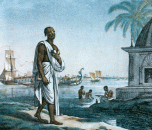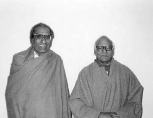---------- Forwarded message ----------
From:
m VOICE OF AMERICA, Jan 23, 2012
Russia and Iran: Uneasy Neighbors — Since the 16th Century
JAMES BROOKE, VOA Moscow Bureau Chief
Countries without natural borders are like amoebas. Over centuries, they expand and contract, expand and contract.
As the Western world wonders why Russia has such a nuanced policy toward Iran’s nuclear program, it is important to skip back over four centuries of history.
Under Ivan the Terrible, Russia defeated the Tatars and Russia started to expand east to Siberia and south to the Caspian Sea. There, it first encountered Persia, forerunner to modern Iran.
Persia’s first ambassador to Russia visited the Kremlin four centuries ago, in 1592. For the next century, wary coexistence ensued between the two empires, one Christian, the other Muslim.
Then, in 1722, Russia expanded south again, embarking on the first of four successful wars against Persia. Steadily, Russia gobbled up chunks of Persia’s Central Asian Empire. With the 1828 Treaty of Turkemnchay, the Caspian Sea became a Russian lake.
One author of that treaty was Russia’s new ambassador to Persia, Alexander Griboyedev, a witty and charming poet and playwright, recently arrived from the court in St. Petersburg.
But Persian resentment of the treaty boiled over when an Armenian eunuch escaped from the Shah’s harem and two Armenian girls escaped from the harem of his son-in-law. Under terms of the new treaty, Armenians were allowed safe passage from Persia to Russian-controlled Armenia. Ambassador Griboyedev stood on principle, and protected his Armenian charges.
What happened next, made the Iranian seizure of the United States embassy in Tehran in 1979, or the sacking of the British embassy two months ago, look like tea parties.
A mob of thousands of rioting Persian overwhelmed the Russian Embassy’s Cossack guards and slaughtered everyone inside. A few days later, the remains of the eunuch were so disfigured that he was only recognized by a scar on his hand.
When Griboyedev’s 16-year-old bride, Nino, learned of her husband’s fate, she became so distraught that she miscarried, and lost their baby. For the rest of her life, she refused all suitors. Today, a larger than life Griboyedev statue in Moscow is a popular meeting point for young people. In St. Petersburg, Griboyedev Canal is a picturesque waterway in the heart of historic city.
The embassy slaughter may live on in Russian’s popular image of Iran. But it did not deter the Kremlin, which retained control of Northern Iran through 1946.
In 1907, with the military rise of Germany, Russia and Britain decided to stop wasting their energy in their “Great Game” over the former Persian empire. That year, they signed in St. Petersburg, the Anglo-Russian Convention. Under this treaty, Persia was divided up between a northern Russian zone, a central neutral zone governed by a Shah, and a southern British zone. This allowed Britain to develop oil deposits in southern Iran and to build a refinery in Abadan. Founded in 1909, the Anglo-Persian Oil Company grew into what is known today as BP.
This division continued until August of 1941, when Britain and the Soviet Union conducted a joint, three-week military campaign and deposed the pro-German Shah, installed his son, Mohammad Reza Pahlavi. For the next five years, the two foreign nations to oversaw what had now come to be called Iran.
In early 1946, the British pulled out, but the Red Army stayed in Northern Iran well beyond an exit deadline stipulated in the Teheran Conference of 1943.
By early 1946, the Cold War was starting and Stalin tried to prolong control over northern Iran by setting up two puppet Soviet republics and signing a oil treaty with Teheran that gave the Soviet Union ownership of 51 percent of northern Iran’s oil deposits. But soon after Red Army troops withdrew from northern Iran, the puppet republics collapsed. In late 1947, Iran’s parliament refused to ratify the oil agreement.
With this history in mind, I could barely repress a smile Wednesday as I sat in the Russian Foreign Ministry’s comfortable new press auditorium building. Minister Sergei Lavrov, perhaps hoping that no one in the hall knew history, was sternly warning that interference in the internal affairs of Iran is “impermissible.”
Here, morality in diplomacy may be dictated by changing realities on the ground.
Six decades of oil earnings and a swelling young population have given Iran a powerful military machine. Now, it may be building a nuclear bomb.
In contrast, the Russian amoeba has retreated. With an aging and shrinking population, Kremlin power projection has dramatically ebbed from the Soviet era high water mark.
In the Caspian, post-Soviet Moscow’s control has receded to about 20 percent of the 7,000 km shoreline. And half of the Russia portion is in Dagestan, where currently the hottest insurgency is underway in Russia’s Islamic south. Instead of Moscow reaching across the Caspian to destabilize Northern Iran, Moscow now fears Iran reaching across the Caspian to destabilize southern Russia.
Last year’s Arab Spring, ended a series of Soviet legacy relationships. Russian influence in the Mediterranean receded to a toehold in Tarsus, a naval base on Syria’s coast. Now, Russia seeks to prop up Syria’s government, its last Arab ally in the Mediterranean. This month, Russia sent to Syria its last aircraft carrier and fresh supplies of bullets for Syria’s army. But a large question mark hangs over the future of Syria.
And the Russian public has little taste in overseas military entanglement, whether Syria or Iran.
In Central Asia, Russia talks loudly, but acts cautiously, In June 2010, Roza Otunbayeva, then president of Kyrgyzstan, publicly asked Moscow four times to send troops to end ethnic rioting in Osh. President Medvedev replied that he would study the matter.
Russia’s political system may be authoritarian. But the Kremlin keeps its ear close to the ground through an extensive public opinion polling system.
A weakened military, an aging population, and little popular support for military adventures – these were not the concerns of Ivan the Terrible, or of his modern day equivalent, Joseph Stalin.
So, today, as the Russian amoeba retracts, there is no indication that Russia’s leaders want to tangle with Teheran.








